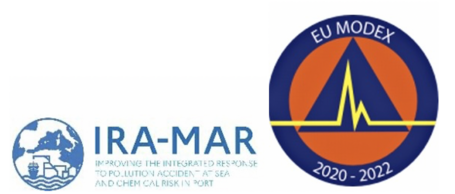
Two EU projects focusing on holistic and integrated management
Sea Alarm is involved in two EU projects that focus on integrated management of marine incidents, the IRA-MAR project and the MODEX-DBX project.
As part of the ‘Improving the Integrated Response to Pollution Incidents at Sea and Chemical Risks in Port’ (IRA-MAR) project, Sea Alarm will carry out a pilot study to explore what European countries can do to improve “holistic and integrated management” of marine pollution incidents.
In their 10-year action plans/strategies, both the Helsinki Convention and the Barcelona Convention aim to “develop a framework for holistic integrated management of marine pollution incidents that enable coordinated response operations at sea and on shore” (Helsinki: Action S32; Barcelona: Action 1.3.4). In its Strategy Action Plan, the Bonn Agreement has a similar objective under Action C.5: “Promote links and coordination with shoreline response”.
The work stream in the IRA-MAR project that is coordinated by Sea Alarm will:
• take a closer look at what countries already have in place to facilitate holistic and integrated management
• Develop a tabletop environment for exercising a holistic and integrated approach to emergency management of marine incidents
• Organise a workshop to bring authority representatives together to discuss and explore good practice on holistic and integrated management
• Develop recommendations from the findings of these three project activities.
In the IRA-MAR project Sea Alarm partners with Secrétariat général de la mer (FR-project coordinator), Cedre (FR). ISPRA (IT) and the Ministerio de Transportes, Movilidad y Agenda Urbana (ES), while a number of countries (TN, MA, PT, ES, MT) are direct beneficiaries of the outcome of the project.
In a separate EU project, Sea Alarm will assist with designing the wildlife components of an integrated management exercise that will be held in Finland early 2023. The MODEX-DBX project is commissioned by the European Commission and carried out by a consortium led by Johanniter-Unfall-Hilfe (DE).
Designed as a “discussion-based exercise”, the intended scenario will include a number of complications that will pose serious challenges to both at sea and onshore authorities, requiring them to work closely together in an integrated management system. The scenario also allows the mobilisation and deployment of international resources via the EU’s Common Emergency Communication and Information System (CECIS), a web-based alert and notification application which enables real-time information exchange and Emergency Response Coordination Centre (ERCC), the EU’s Civil Protection Mechanism providing emergency support to disaster-stricken countries and coordinating the efforts of EU countries in such responses.
The exercise, to be held in February 2023 will take a full week, during which there will be introductions to the exercise, delivery of the exercise, and a closing seminar to capture lessons learned.
